Sara Ahmed
Sara Ahmed
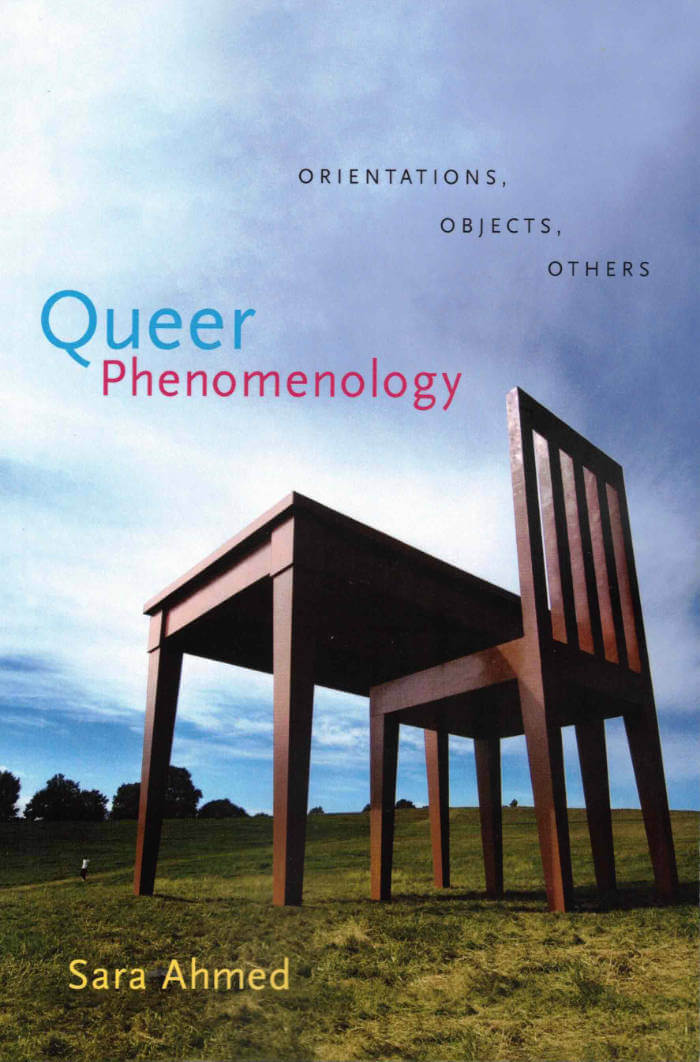
Queer Phenomenology
In this groundbreaking work, Sara Ahmed demonstrates how queer studies can put phenomenology to productive use. Focusing on the “orientation” aspect of “sexual orientation” and the “orient” in “orientalism,” Ahmed examines what it means for bodies to be situated in space and time. Bodies take shape as they move through the world directing themselves toward or away from objects and others. Being “orientated” means feeling at home, knowing where one stands, or having certain objects within reach. Orientations affect what is proximate to the body or what can be reached. A queer phenomenology, Ahmed contends, reveals how social relations are arranged spatially, how queerness disrupts and reorders these relations by not following the accepted paths, and how a politics of disorientation puts other objects within reach, those that might, at first glance, seem awry.
Ahmed proposes that a queer phenomenology might investigate not only how the concept of orientation is informed by phenomenology but also the orientation of phenomenology itself. Thus she reflects on the significance of the objects that appear—and those that do not—as signs of orientation in classic phenomenological texts such as Husserl’s Ideas. In developing a queer model of orientations, she combines readings of phenomenological texts—by Husserl, Heidegger, Merleau-Ponty, and Fanon—with insights drawn from queer studies, feminist theory, critical race theory, Marxism, and psychoanalysis. Queer Phenomenology points queer theory in bold new directions.
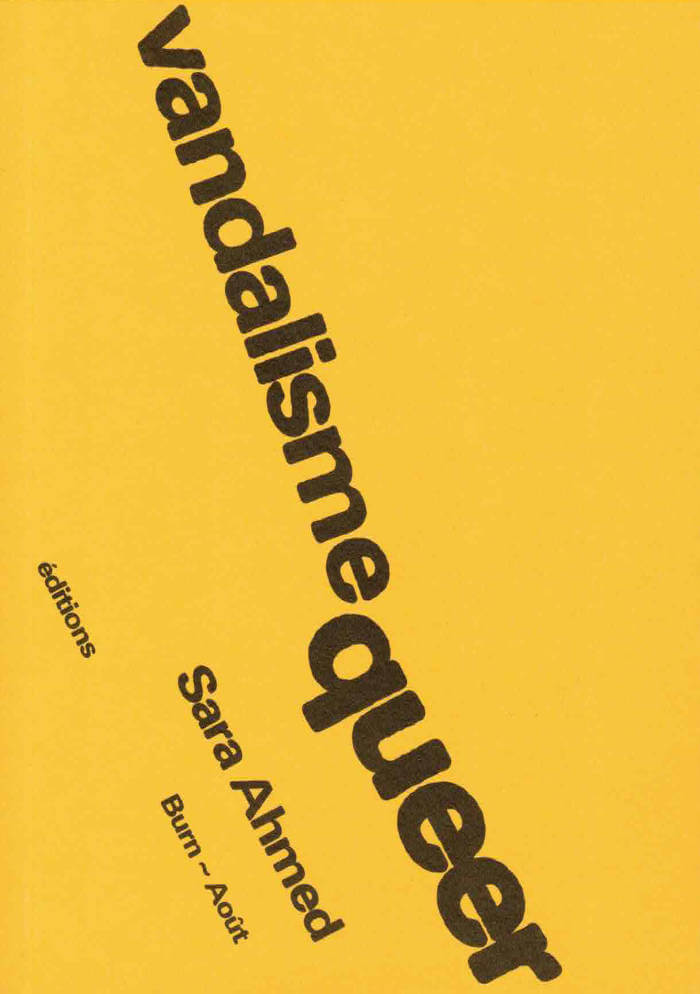
Vandalisme queer
Sara Ahmed, Mabeuko Oberty and 1 more
La philosophe Sara Ahmed se présente parfois comme « une rabat-joie féministe, une alienne affective, une femme queer racisée en colère ». Depuis plus de dix ans, elle tient un blog, feministkilljoys.com, où elle publie des morceaux de ses livres et de ses conférences. Dedans, on trouve des bouts de rages - contre le harcèlement sexuel à la fac où elle enseigne, contre le racisme institutionnel, contre le capitalisme carcéral... — mais aussi des célébrations des solidarités et des activismes transféministes. De là sont extraits les trois textes rassemblés dans ce court recueil, « Vandalisme queer », « Usage queer» et « La plainte, méthode queer»; des textes qui ont tous pour point commun de réfléchir aux potentiels d'interruption du mot queer. Queer, oblique, pas droit.e.s, déviant.e.s : des termes pour se mettre en travers des chemins trop bien tracés. Des textes comme autant d'appels à multiplier les existences vandales.
Un tuyau percé peut mener à un autre; il peut le faire et il le fait. Il suffit parfois de desserrer un écrou, un petit peu, juste un tout petit peu, pour que l'explosion ait lieu. Et nous avons besoin de plus d'explosions. Les usages queers, les usages obliques, décrivent ce potentiel d'explosion. Ils décrivent la manière dont les petites déviations, les petits desserrements, la création d'une issue de secours, l'ouverture d'une échappée, peuvent aider à multiplier toutes sortes de fuites et de sorties.
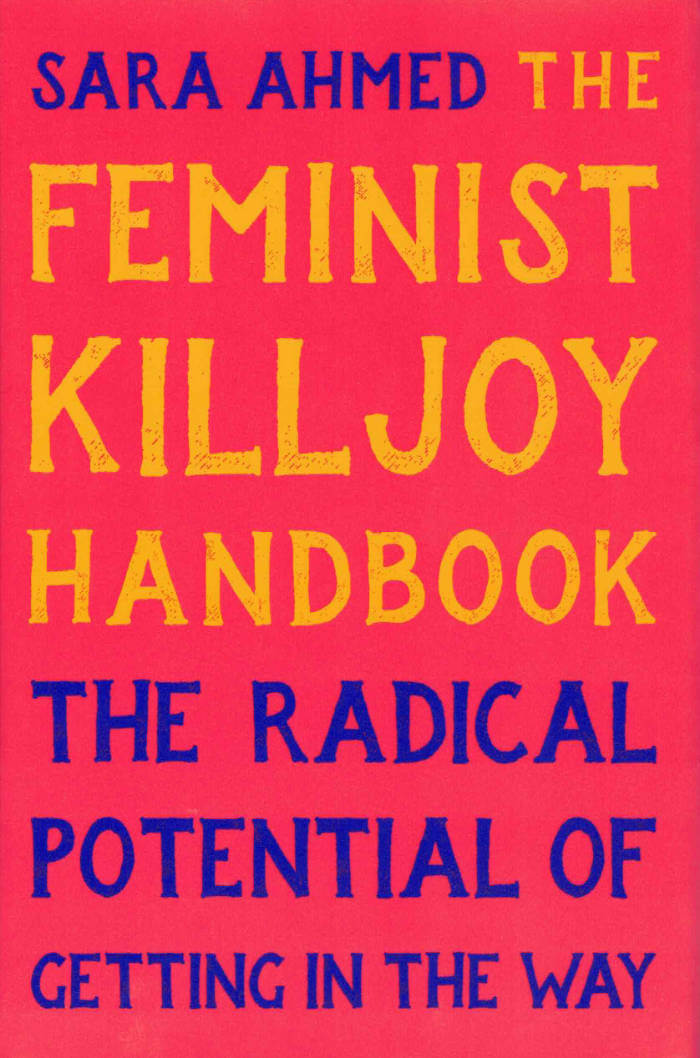
The Feminist Killjoy Handbook: The Radical Potential of Getting in the Way
A renowned feminist thinker argues we need to get in the way of happiness, our own and other people’s, to build a more just world
Do you refuse to laugh at offensive jokes? Have you ever been accused of ruining dinner by pointing out your companion’s sexist comment? Are you often told to stop being so “woke”? If so, you might be a feminist killjoy—and this handbook is for you. In this book, feminist theorist Sara Ahmed shows how killing joy can be a radical world-making project.
Presenting sharp analysis of literature, film, and influential feminist works, and drawing on her own experiences as a queer feminist scholar-activist of color, Ahmed reveals the invaluable lessons of the feminist killjoy, from the importance of asking questions to the power of the eye roll. The Feminist Killjoy Handbook offers an outstretched hand to feminist killjoys everywhere and an essential intellectual guide to the transformative power of getting in the way.
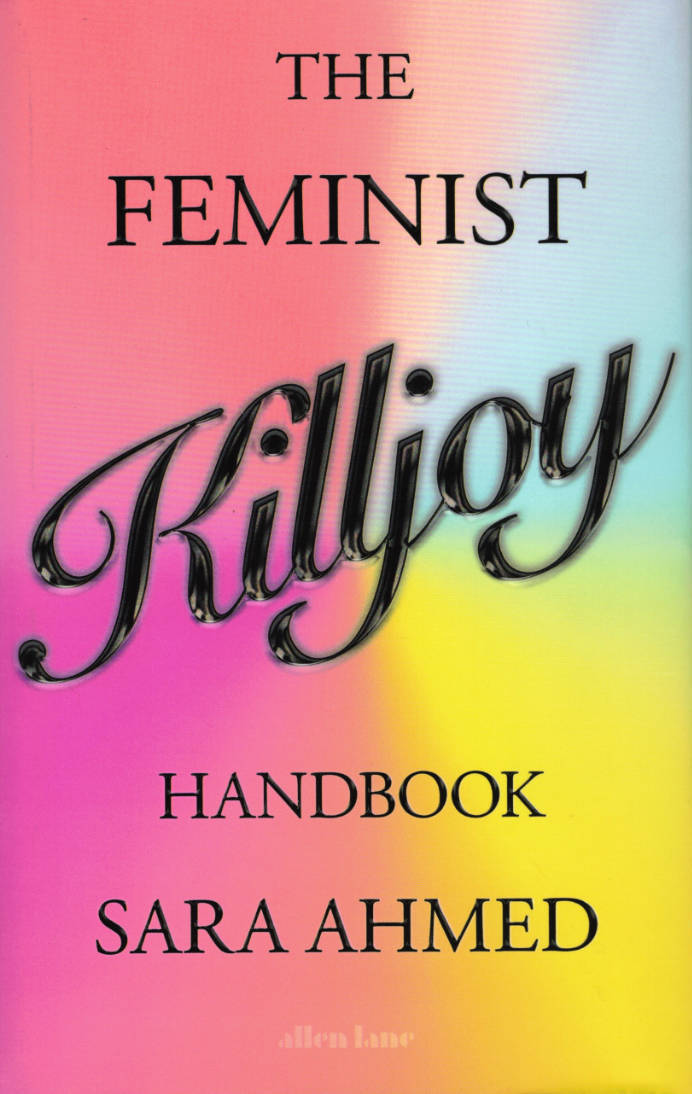
The Feminist Killjoy Handbook
Drawing on her own stories and those of others, especially Black and brown feminists and queer thinkers, Sara Ahmed combines depth of thought with honesty and intimacy. The Feminist Killjoy Handbook unpicks the lies our culture tells us and provides a form of solidarity and companionship that can be returned to over a lifetime.
We have to keep saying it because they keep doing it.
Do colleagues roll their eyes in a meeting when you use words like sexism or racism? Do you refuse to laugh at jokes that aren't funny? Have you been called divisive for pointing out a division? Then you are a feminist killjoy, and this handbook is for you.
The term killjoy has been used to dismiss feminism by claiming that it causes misery. But by naming ourselves feminist killjoys, we recover a feminist history, turning it into a source of strength as well as an inspiration.
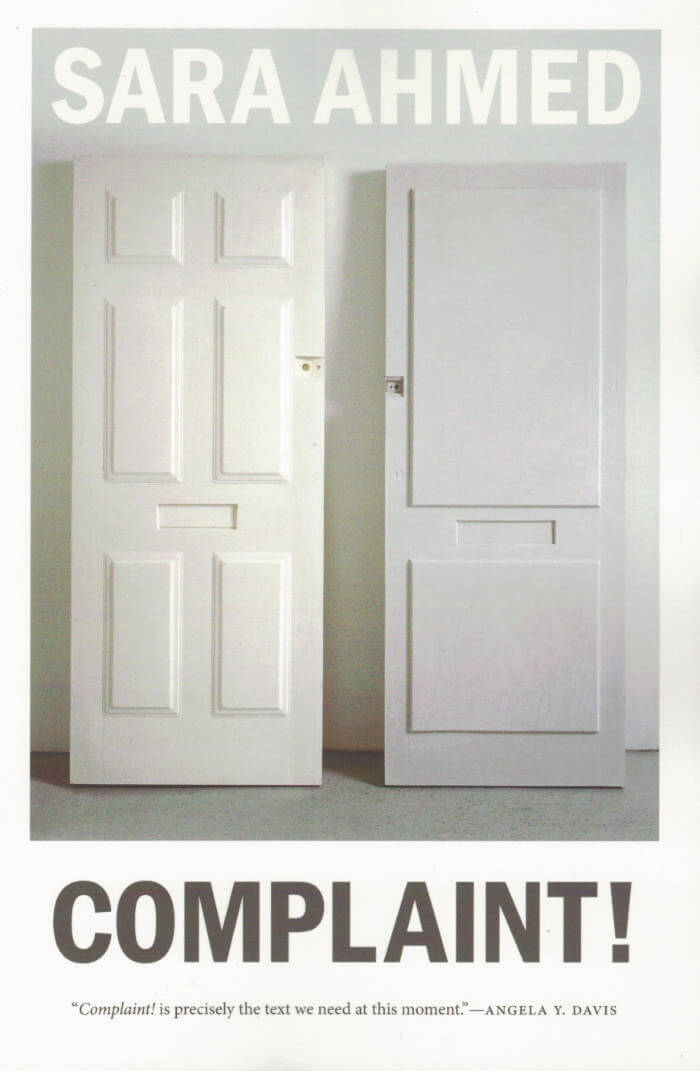
Complaint!
In Complaint! Sara Ahmed examines what we can learn about power from those who complain about abuses of power.
Drawing on oral and written testimonies from academics and students who have made complaints about harassment, bullying, and unequal working conditions at universities, Ahmed explores the gap between what is supposed to happen when complaints are made and what actually happens. To make complaints within institutions is to learn how they work and for whom they work: complaint as feminist pedagogy. Ahmed explores how complaints are made behind closed doors and how doors are often closed on those who complain. To open these doors—to get complaints through, keep them going, or keep them alive—Ahmed emphasizes, requires forming new kinds of collectives.
This book offers a systematic analysis of the methods used to stop complaints and a powerful and poetic meditation on what complaints can be used to do. Following a long lineage of Black feminist and feminist of color critiques of the university, Ahmed delivers a timely consideration of how institutional change becomes possible and why it is necessary.

Living a Feminist Life
In Living a Feminist Life Sara Ahmed shows how feminist theory is generated from everyday life and the ordinary experiences of being a feminist at home and at work.
Building on legacies of feminist of color scholarship in particular, Ahmed offers a poetic and personal meditation on how feminists become estranged from worlds they critique—often by naming and calling attention to problems—and how feminists learn about worlds from their efforts to transform them.
Ahmed also provides her most sustained commentary on the figure of the feminist killjoy introduced in her earlier work while showing how feminists create inventive solutions—such as forming support systems—to survive the shattering experiences of facing the walls of racism and sexism. The killjoy survival kit and killjoy manifesto, with which the book concludes, supply practical tools for how to live a feminist life, thereby strengthening the ties between the inventive creation of feminist theory and living a life that sustains it.

What's the Use?
In What’s the Use? Sara Ahmed continues the work she began in The Promise of Happiness and Willful Subjects by taking up a single word—in this case, use—and following it around. She shows how use became associated with life and strength in nineteenth-century biological and social thought and considers how utilitarianism offered a set of educational techniques for shaping individuals by directing them toward useful ends.
Ahmed also explores how spaces become restricted to some uses and users, with specific reference to universities. She notes, however, the potential for queer use: how things can be used in ways that were not intended or by those for whom they were not intended. Ahmed posits queer use as a way of reanimating the project of diversity work as the ordinary and painstaking task of opening up institutions to those who have historically been excluded.
And more

Love & Lightning
Love & Lightning: A Collection of Queer and Feminist Manifestos is a thematically ordered, inconclusive collection of queer, feminist and queer-feminist manifestos. Girls Like Us Magazine and author Sarah van Binsbergen have composed a publication showcasing the different forms a manifesto might have, from classical, activist formats to more poetic, associative texts. The manifestos highlighted in this book cross borders, forms and disciplines, refuse binary logics, transcend our concepts of time and space and surpass the neoliberal logic.
Love & Lightning does not claim to be a complete anthology, but it rather aims to show the myriad of ways manifestos can be composed, and what their legacy until this day is. It presents manifestos from 1851 until now, divided into eleven chapters, introduced in their socio-historical and geographical contexts, with many from Asia, Africa, Latin-America. Not only does this publication give new insight in the style of the manifesto, it aims to emancipate the reader to propose their own revolution, whether big or small.
Manifestos include: Ain’t I a Woman by Soujourner Truth; Work Will Not Save Us: An Asian American Crip Manifesto; Rest is Resistance by Tricia Hersey; The Manukan Declaration of the Indigenous Women’s Biodiversity Network; W.I.T.C.H. Manifesto; Fag Hags Fight Back!!!; Manifesto for Maintenance Art by Mierle Laderman-Ukeles; Dyke Manifesto from the Lesbian Avengers; Killjoy Manifesto by Sara Ahmed; Xenofeminism: A Politics for Alienation by Laboria Cuboniks; The Empire Strikes Back: A Posttransexual Manifesto from Sandy Stone; Refugia! Manifesto for Becoming Autonomous Zones by subRosa; Countersexual Manifesto from Paul B. Preciado; and many, many more.

Bodies of Sound: Becoming a Feminist Ear
‘I am concerned with the power of sound! and what it can do to the body and the mind,’ wrote composer Pauline Oliveros. In the body, histories and politics come together with sound and listening, memory and feeling. Bodies of Sound offers a resonant exploration of feminist sonic cultures and radical listening in over fifty contributions. In this book of echoes, a variety of forms – from essays to text scores to art, fiction and memoir – speak across gender, ways of knowing, witnessing, sounding and voicing, translation, displacement, violence and peace.
With contributions from:
Sara Ahmed, Ximena Alarcón, Svetlana Alexievich, Ain Bailey & Frances Morgan, Anna Barham, Xenia Benivolski, Leanne Betasamosake Simpson & Kite, Elena Biserna, Karen Barad & Black Quantum Futurism, Anne Bourne, Daniela Cascella, Theresa Hak Kyung Cha, Maria Chávez, Don Mee Choi, Carson Cole Arthur, Petero Kalulé & AM Kanngieser, Lindsay Cooper, Julia Eckhardt, Lucia Farinati & Claudia Firth, Ella Finer, Annie Goh, Louise Gray, Christina Hazboun, Johanna Hedva, Sarah Hennies, Tomoko Hojo, IONE, Lee Ingleton, Hannah Catherine Jones, Christine Sun Kim, Nat Lall, Cathy Lane, Jeanne Lee & Lona Foote, Marysia Lewandowska, Annea Lockwood & Jennifer Lucy Allan, Cannach MacBride, Elaine Mitchener & Hannah Kendall, Alison O'Daniel, Naomi Okabe, Pauline Oliveros, Daphne Oram, Gascia Ouzounian, Holly Pester, Roy Claire Potter, Anna Raimondo, Tara Rodgers, Aura Satz & Barbara London, Shortwave Collective, Sisters of the Order of Celestial Nephology, Sop, Syma Tariq, Marie Thompson, Trinh T. Minh-ha & Stoffel Debuysere, Salomé Voegelin

Girls Like Us #14 - Letters of Disappointment
Marnie Slater, Katja Mater and 2 more
Considered an ‘ugly feeling’ by society’s norm, we’re not supposed to vocalize what and who is letting us down. We’re supposed to stay positive, get organized and act, instead of lingering in negative emotions. We’re supposed to be productive. But making space for disappointment can be a strategy of dissensus. Instead of wallowing in impotence, to make explicit what is not meeting expectations for this world can be an act of renouncing and making cracks in the status quo, while not giving up allegiance that another world is possible.
In Living a Feminist Life, Sara Ahmed writes: ‘we might think of how becoming feminist put us in touch with all that sadness, all those emotions that represent a collective failure to be accommodated to a system as the condition of possibility for living another way.’
In this issue we hope to plant the seeds of this rebellion by collecting a larger body of letters of disappointment. No matter how vague, impersonal, unimportant, futile, banal, or contingent these memories may seem; when shared and brought into a wider collective context, political desire may slip out from between the lines and build a corpus of transfeminist inheritance.
While spending some time with a tarot deck in preparation for this issue we obviously pulled the card of disappointment. In this deck, the illustration shows a beautiful drought: five crystal cups, which in the other cards overflow with fresh water, are shown here empty and dry.
‘The Five of Cups stands for an emotional crisis. It might be that unconscious fears come true, it could tell that feelings are disrupted or wasting away, the soul is empty and unfulfilled. In the sequence of the cups, the Five is the logical consequence of the Four. The grey tristesse that was lurking behind the luxury’s glamour is now exposed, the ‘truth is out’. The Five of Cups implies the loss of illusion, the realization of a deception. It hurts, but is necessary when we don’t want to spend the rest of our lives with our heads in the sand.’
We leave it up to you to imagine the possibilities or boundaries of what spending time with disappointment can make happen, for you, in your community, in the world.
Contributors: Pelumi Adejumo, Clara Balaguer, Dagmar Bosma, Staci Bu Shea, Alba Clevenger, Athena Farrokhzad, Sharona Franklin, Maike Hemmers, Calla Henkel, Sara Kaaman, Alena Kolesnikova, Maoyi (Peixuan Qiu), Katja Mater, Yelena Moskovich, Djuwa Mroivili, Sands Murray-Wassink, Raoni Muzho, Iarlaith Ni Fheorais, Ashley Nkechi Igwe, Milica Trakilović, Shola von Reinhold, Selma Selmani, Terre Thaemlitz, Yin Yin Wong, Anna Zvyagintseva, Sophie Zwertbroek, Joanna Walsh, Rosa Luxemburg, Yoyes Maria Dolores Gonzalez Katarain, Clara Zetkin, Alexandra Kollontai and Audre Lorde

The Material Kinship Reader
Kris Dittel, Clementine Edwards
What does it mean to acknowledge one’s closeness to, enmeshment in or even kinship with the material world? And what does it mean to question family structures – the way they organise, coerce and make deviant certain lifeforms – and dwell in other possibilities of kin-making?
Not just a jolly rethinking of objects or a polyamorous romp through relationships, The Material Kinship Reader reckons with the extractavist histories of materials and the social relations that frame much of contemporary life.
Spanning fiction and theory, the collection of texts expand the idea of an artist’s book by bringing words into conversation with an aesthetic proposition. Clementine Edwards’ artwork is the visual weft to the book’s written net. From colonial conquest to climate collapse, The Material Kinship Reader tells toxic and tender stories of interdependence among all things sentient and insentient.
Including contributions by Sara Ahmed, Hana Pera Aoake, Roland Barthes, Joannie Baumgärtner, Heather Davis, Kris Dittel, Clementine Edwards, Ama Josephine B. Johnstone, Robin Wall Kimmerer, Ursula K. Le Guin, Sophie Lewis, Steven Millhauser, Jena Myung, Aileen Moreton-Robinson, Michelle Murphy, Ada M. Patterson, Kim TallBear and Michelle Tea

Reading / Feeling
Frédérique Bergholtz, Tanja Baudoin
Reading / Feeling examines affect, a term that delineates a field where the personal and political meet in sensory movements between bodies. A pre-emotional experience, affect constitutes the social and economic relationships that make up the fabric of society. Reading / Feeling considers the meaning of affect in theory and artistic practice through texts by theoreticians, artists, and curators read in If I Can’t Dance’s Reading Groups in Amsterdam, Toronto, and Sheffield as part of the programme for Edition IV – Affect (2010–12). It also includes three new essays, short statements by Reading Group members, and artist pages.
Contributors: Sara Ahmed, Rhea Anastas, Lauren Berlant, Leo Bersani, Lone Bertelsen, Gregg Bordowitz, Judith Butler, Jeremiah Day, Gilles Deleuze, Lucien Febvre, Simone Forti, Adam Frank, Andrea Fraser, Félix Guattari, Michael Hardt, Sharon Hayes, Brian Holmes, Jutta Koether, Glenn Ligon, Brian Massumi & Mary Zournazi, Helen Molesworth, Andrew Murphie, Sina Najafi & David Serlin, George Orwell, Emily Roysdon, Eve Kosofsky Sedgwick, Baruch Spinoza, Susan Sontag, Jan Verwoert; it also includes: essays by Tanja Baudoin, Emma Cocker, Jacob Korczynski; contributions by Reading Group members Stephen Bowler, Alison J Carr, Belen Cerezo, Jon Davies, Anik Fournier, Victoria Gray, Linda Kemp, Wjm Kok, Janice McNab, Gabrielle Moser, Cecilia Paldino, Andrew James Patterson, Hester Reeve, Julie Swalloa, cheyanne turions, Vivian Ziherl; and artist pages by Matthew Lutz-Kinoy.

Pasts, Futures, and Aftermaths: Revisiting the Black Dada Reader
The sequel to Pendleton's acclaimed Black Dada Reader, compiling an anti-canon of radical experimentation and thought.
In 2011, artist Adam Pendleton (born 1984) assembled Black Dada Reader, a compendium of texts, documents and positions that elucidated a practice and ethos of Black Dada. Resembling a school course reader, the book was a spiral-bound series of photocopies and collages, originally intended only for personal reference, and eventually distributed informally to friends and colleagues. The contents - an unlikely mix of Hugo Ball, W.E.B. Du Bois, Adrian Piper, Gertrude Stein, Sun Ra, Stokely Carmichael, Gilles Deleuze -formed a kind of experimental canon, realized through what Pendleton calls radical juxtaposition. In 2017, Koenig Books published the Reader in a hardcover edition, with newly commissioned essays and additional writings by the artist. A decade later, Pendleton has composed another reader, building upon the constellation of writers, artists, filmmakers, philosophers and critics that emerged in the first volume.
Source texts by Sara Ahmed, Mikhail Bakhtin, Toni Cade Bambara, Amiri Baraka, Augusto de Campos, Hardoldo de Campos, and Décio Pignatari, Angela Davis, Gilles Deleuze, Julius Eastman, Adrienne Edwards, Clarice Lispector, Achille Mbembe, Philippe-Alain Michaud, Charles Mingus, Piet Mondrian, Leslie Scalapino, Leonard Schwartz and Michael Hardt, Juliana Spahr, Cecil Taylor and Malcolm X.

Where Are the Tiny Revolts?
Anthony Huberman, Jeanne Gerrity
Where are the tiny revolts? is the first book in a new annual series published by CCA Wattis Institute, a contemporary art center and research institute in San Francisco. Each book in the series is driven by a central question: what are we learning from artists today? Unconnected to an exhibition program, Where are the tiny revolts? is rooted in the Wattis's artist-driven research institute. It is a place to explore and share some of the texts and visual work that emerge over the course of an entire year of discussions and public programs. Instead of providing documentation of projects with artists, Where are the tiny revolts? offers other ideas, voices, and references generated by conversations with and about artists.
The first book in the series, informed by themes related to the work of Dodie Bellamy, revolves around questions related to contemporary forms of feminism and sexualities, the rebirth of the author, and ways in which vulnerability, perversion, vulgarity, and self-exposure can be forms of empowerment. The texts cover a broad array of styles, including memoir, theoretical essay, art historical analysis, poetry, and fiction. The visual elements are equally diverse, ranging from photographs to collage to drawing.
Texts by Sara Ahmed, Nicole Archer, Georges Bataille, Dodie Bellamy, Michele Carlson, Thomas Clerc, Combahee River Collective, Bob Flanagan, Ursula K. Le Guin, Johanna Hedva, Glen Helfand, Juliana Huxtable, Alex Kitnick, Julia Kristeva, Audre Lorde, Lisa Robertson; contributions by Marcela Pardo Ariza, Justin G. Binek, Kaucyila Brooke, Tammy Rae Carland, Mary Beth Edelson, Mike Kuchar, Anne McGuire, Patrick Staff, Frances Stark, Rosemarie Trockel.

Second Sex War
Sidsel Meineche Hansen, Robert Leckie
Stemming from a series of works by Sidsel Meineche Hansen, this monographic catalogue offers a range of perspectives on urgent issues around gender, sexuality and labour in the digital age.
This book orbits “Second Sex War”, a series of works by Sidsel Meineche Hansen addressing political and ethical questions arising from the use of digital bodies in contemporary visual culture and the means of production and distribution for these commodities. Realising that the same avatars are used across the pornographic, gaming and cultural industries, she investigates the working conditions and relationships that structure these fields. Through numerous essays and conversations, Second Sex War, the book, emphasises her collaborations with various practitioners (animators, musicians, writers) and the way they have inflected her practice. Media theorist Helen Hester (author of the Xenofeminist manifesto) reflects on the limitations of the porn industry and the use of female avatars. Artists collective Radclyffe Hall talks to photographer Phyllis Christopher about early lesbian erotica magazine in the 1980s. Linda Stupart compiles quotes by Sara Ahmed, Kathy Acker and Ursula K. Le Guin to consider what is radical sex today. Artist Hannah Black's contribution, which opens the publication, reads like a manifesto for artists being crushed under the weight of current political circumstances.
Edited by Sidsel Meineche Hansen and Robert Leckie.
Texts by Robert Leckie, Hannah Black, Helen Hester, Phyllis Christopher & Radclyffe Hall, Linda Stupart, Josefine Wikström. Entretiens with Helena Vilalta, James B Stringer, Melika Ngombe Kolongo (Nkisi) by Sidsel Meineche Hansen.
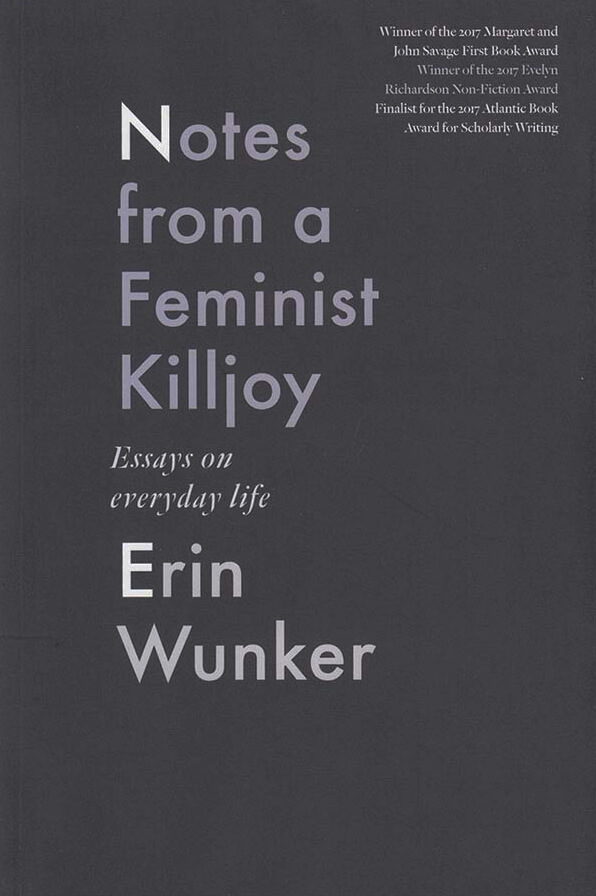
Notes from a Feminist Killjoy
Following in the tradition of Sara Ahmed (the originator of the concept “feminist killjoy”), Wunker brings memoir, theory, literary criticism, pop culture, and feminist thinking together in this collection of essays that take up Ahmed’s project as a multi-faceted lens through which to read the world from a feminist point of view.

Your Silence Will Not Protect You
With a preface by Reni Eddo-Lodge and an introduction by Sara Ahmed.
Audre Lorde (1934-92) described herself as ‘Black, lesbian, mother, warrior, poet’. Born in New York, she had her first poem published while still at school and her last the year she died of cancer. Her extraordinary belief in the power of language – of speaking – to articulate selfhood, confront injustice and bring about change in the world remains as transformative today as it was then, and no less urgent. This edition brings Lorde’s essential poetry, speeches and essays, including ‘The Master’s Tools Will Never Dismantle the Master’s House’, together in one volume for the first time.